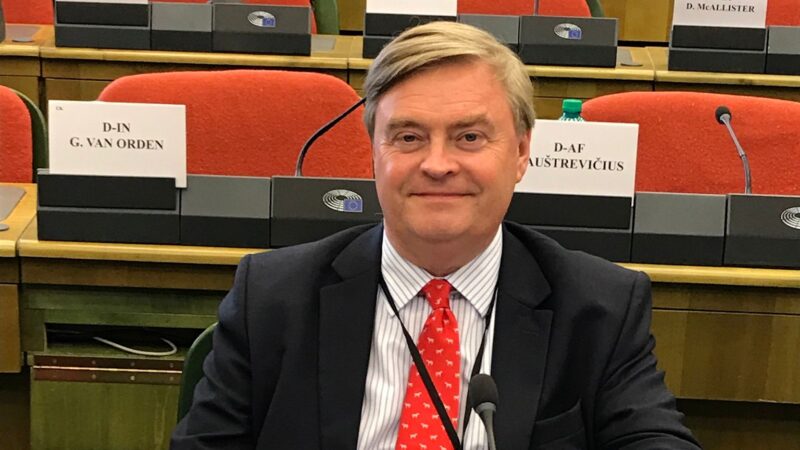The UK elections this Thursday, July 4, 2024, seem to have been decided for two years. Most polls give a wide victory with a large absolute majority to the Labour Party, after the disastrous management of the Conservative Party Post-Brexit and the scandals in the Covid period by former Prime Minister Boris Johnson.
For this reason, we at The Long Brief have decided to interview David Campbell Bannerman, a person who has been involved in British politics since 1985. Campbell has spent 32 years in the British Conservative Party (1985-2004 and 2011-present) and spent a short period of time in the Independence Party (UKIP; 2004-2011) both inside the UK and as a Member of the European Parliament.
What is your assessment of the British government’s post-Brexit management?
The British government has failed to sell the benefits of Brexit from a combination of lack of belief in Brexit at the top and institutional, cultural and media resistance.
However, there are seven benefits of Brexit. Brexit means we run our own country again. We have regained sovereignty of our country and are in charge again and not subject to EU diktats and Central control. That is the main benefit of Brexit – sovereignty.
Brexit means better trade. This is one area the British Government has done well at, signing the Comprehensive and Progressive Agreement for Trans-Pacific Partnership (CPTPP) which is bigger than the EU.
Brexit means a better economy, too. We have outgrown Germany since the 2016 Referendum and are predicted by the OECD to outpace France and the EU in the next few years.
Brexit means we control our own borders. We have stopped free movement but are struggling with vested interests like companies and universities wanting cheap labour. But we are in charge and the public are punishing the government in the election now for not delivering on controlling borders. There is nowhere to hide.
Brexit has strengthened our defences and standing in the world, for example we led world on defending Ukraine when the USA failed to and when the EU, dominated by Germany are afraid of losing cheap gas, didn’t react. Also led the world on finding a Covid vaccine.
Brexit has saved billions in EU fees and membership costs. £19 billion gross (£12bn net) but which would be closer to £25bn gross now. We have saved £190bn alone for not having to fund EU Covid programme.
Brexit has given us independence in fishing, farming and the environment.
Do you think that despite the Conservative government’s post-Brexit management, Brexit has remained the right choice?
Yes. We are an independent sovereign country again like Canada, Australia or the United States.
We are just slow and reticent at seizing the above-mentioned seven opportunities.
Likewise, Brexit has hardly been mentioned in this election. It is only important to 10 percent of population as election issue now compared to 70 percent in the 2019 ‘Get Brexit Done’ election. Both parties want to avoid mentioning it. Those wishing to rejoin very annoyed are being ignored.
There is a certain sector in British society that wants to return to the European Union. Is it possible that there will be a new referendum or is it totally out of the question?
I don’t trust Labour not to seek a second Brexit referendum, most likely in a second term of Government, and by fixing the result such as giving EU citizens the vote. Labour are denying they will rejoin the Customs Union, single market or free movement again.
The lack of support for Brexit and failure to sell it means Brexit remains unpopular but the same polls show that they would not rejoin the EU.
Rejoining the EU would mean losing power and control over our lives. Rejoining the EU would mean losing the Pound – we’d have to join the Euro. Rejoining the EU would mean surrendering all our better UK trade deals such as CPTPP and ones EU not done such as India (to come), Australia etc. Rejoining the EU would mean our economy is run from Germany and Brussels not the UK. Rejoining the EU would mean loss of control over our borders and immigration. Rejoining the EU would mean loss of control over UK Defence and Security – the EU is now closer than ever to being a single European superstate and melting away all EU nation states such as Hungary. Rejoining the EU would mean paying billions more in handouts to the EU. The bill will be larger than ever especially with 10 more dependent states wanting to join.
According to most polls, the Conservative Party will suffer one of the biggest defeats in history. What has happened?
Yes. Worse since 1906 (when my great great great uncle Sir Henry Campbell-Bannerman the Liberal Prime Minister won the election). It has been a terrible campaign.
Rishi Sunak is a poor campaigner and called the election six months early before improvements such as lower interest rates and price cuts took place.
The campaign has been full of unnecessary mistakes and a dismal failure.
If the Labour Party wins, which is what it looks like, how do you think it will affect the UK?
I think Labour will do some bad things such as driving up taxes substantially and getting closer to the EU bit by bit. They will fuel yet more wokery and State interference.
Starmer seems an unenthusiastic leader and backed extreme politics such as backing Jeremy Corbyn who wanted to get rid of Britain’s nuclear deterrent and who personally came up with plan for a second EU Referendum which is undemocratic in seeking to overturn a democratic vote of 17.4 million people far more than voted for the last government (14 million).
We have seen that Reform UK, the party led by Nigel Farage, has climbed very fast in the polls, even surpassing the Tories in percentage of the vote in some polls, although we already know that in the British electoral system this would not translate into number of seats. Why has Farage grown so much?
The centre right in the UK has split almost entirely in two – polls have Conservatives and Reform on 18 percent vote each. Because Conservatives including core Conservative members (I am Chairman of the Conservative Democratic Organisation with thousands of activists) don’t see the Sunak Government as truly Conservative whilst Reform is truly Conservative, more Thatcherite.
With Farage’s latest statements on the war between Russia and Ukraine, the debate has been opened in the British right on the official position. In the EU the same is happening within the ECR group (in which the Tories used to be) and ID. What is the majority position in the British right wing and in general in the British society regarding the war?
Farage’s comments are seen in the UK as a big mistake. There is no time to get into the nuances and deeper arguments. He is just seen to be pro Putin and an appeaser. This is unfair but his stance is not liked on the doorstep. It was an unnecessary distraction and Reform has most support.
I warned as an MEP of the risk of poking the Russian bear by the EU–Ukraine Association Agreement having too much on defence and security in it; trade and cooperation would have been less sensitive.
But condemn utterly the invasion of Ukraine territory.
You have been memeber of the Conservative Party and also there was a period in which you were in UKIP. Do you think the Tories and Reform UK are ready to understand each other?
I was not a candidate in this election as I was so critical of the Sunak government. I wanted Sunak to step aside and that would have saved us from this political meltdown – what I call a ‘Conservative Chernobyl’.
We were close before this election but the stakes are high and the mutual attacks means that working together will be unlikely for several years now. Depending on the result, we should work together and I would personally welcome Farage returning to the Conservative Party.
He is a natural Conservative and was a member until 1993 and the betrayal of Maastricht.
So much is unclear before the election but will shape events after. Farage as an MP will be a powerful and commanding voice in the House of Commons and my party much smaller and bruised sadly.








[…] agreed before the election that the next government would face the hardest fiscal challenge in 70 […]